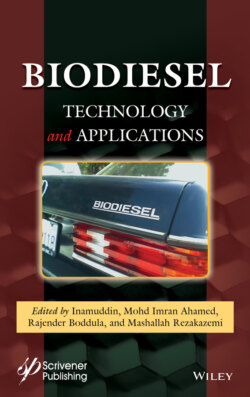Читать книгу Biodiesel Technology and Applications - Группа авторов - Страница 32
1.9 Recombinant Lipases for Cost-Effective Biodiesel Production
ОглавлениеIn order to produce economically feasible and cost-effective enzymatic biodiesel production, various methods have been used. For example, improvement in purification procedures, use of better bioreactors, various immobilization techniques, use of easy to handle solvents and solution, finding novel organisms that can produce more stable and effective lipases. These genetic manipulations enable recombinant organism to overexpress active lipases. A lot of work has been done to produce recombinant lipases from recombinant organisms by deriving desired gene from another specie or organism to meet our demands. According to Huang et al. [173], a good conversion of microalgal oil into FAME and FAEE was obtained (<90%) when recombinant lipase from Rhizomucor miehei was expressed in Pichia pastoris, in the presence of methanol and ethanol as acyl acceptor, respectively. That recombinant lipase enzyme was called Lipase GH2 and it was used as free enzyme for catalysis. Aspergillus oryzea has been used majorly for lipase expression as manipulating organism. Adachi et al. [174] created thermostable and solvent tolerant whole-cell biocatalysts that worked as robust biocatalyst for bio-diesel production. Geobacilus thermocatenulatus was used as a source organism from which thermostable lipase (BTL2) gene was obtained and then introduced into Aspergillus oryzea (r-BTL). Immobilized whole-cell r-BTL was then used to convert palm oil into FAME production and the resultant yield obtained was 100%. Whole-cell biocatalyst tolerated 40-50°C temperature and 30% (v/v) solvents such as methanol, DMC, and acetone. These results proved the thermostability and solvent tolerance of Aspergillus oryzea (r-BTL). Lipase from B68 strain of Pseudomonas fluorescence (lipB68) was transformed into E. coli BL21 which resulted in 92% yield upon transesterification. The amazing thing about this experiment was use of that novel psychrophilic lipase (lipB68) that catalyzed reaction at 20°C and energy consumption became reduced in the reaction system [175]. So, use of psychrophilic lipase for biodiesel production can become more useful in the future. In many research experiments, recombinant lipases have performed better than commercially used lipases. For example, according to Yan et al. [176], recombinant Pichia pastoris strain was developed that used to overexpress Thermomyces anuginosus lipase. When this strain was used as a whole-cell biocatalyst, it efficiently converted waste cooking oil into FAME with 82% yield within 84 h. After comparing this recombinant strain performance with commercial lipase Lipozyme TLIM, it was found that the earlier one outperformed the later one. In another research, lipase LIP2 coding gene was cloned from Candida rugosa and expressed in Pichia pestoris after changing some codons of that gene by side directed mutagenesis to make it more useful and active. So, then that recombinant Candida rugose gave better results when results of commercial C.rugosa lipase and recombinant LIP4 were compared because recombinant LIP2 lipase was tolerating temperature 30°C–50°C and work even at 70°C [177]. A lot of research has been done in utilizing recombinant lipases and found better results. Tables 1.5 and 1.6 showed some examples of recombinant whole-cell lipases with and without immobilization.
Table 1.5 Some research investigations using recombinant whole-cell biocatalyst after immobilization.
| Expressing lipase source | Immobilized on | Substrate | Acyl acceptor | Yield | Reference |
|---|---|---|---|---|---|
| Fusarium heterosporum | Biomass support particles | Aqueous plant oil emulsion | Methanol | 96.1% | [178] |
| Soybean oil | Methanol | 98% | [179] | ||
| Thermomyces lanuginosus | Protein-coated microcrystals | Palm olein | Ethanol | 89.9% | [180] |
| Crude palm oil | 82.1% | ||||
| Palm fatty acid distillate | 75.5% | ||||
| Geobacillus thermocatenulatus (BTL2) | Reticulated polyurethane foam BSPs | Palm oil | Methanol | ~100% | [174] |
| Proteus mirabilis | hydrophobic Immobead 350 oxirane functionalized beads | Canola oil | Methanol | 76% | [181] |
| Staphylococcus haemolyticus L62 | poly (methacrylate-co-divinyl benzene) resin | Olive oil | Methanol | 90% | [182] |
